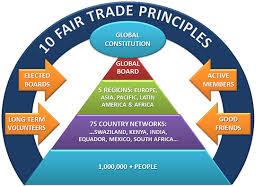
With developing countries driving economic growth and energy use worldwide, adopting climate-friendly clean energy and sustainable development pathways in these nations has become a priority for the U.N., World Bank Group and other multilateral lending organizations, as well as governments, around the world.
Providing local small businesses, cooperatives and communities with streamlined, cost-effective access to international climate funds continues to be a major sticking point, however. Voluntary, private carbon offset credit systems providers and international organizations founded on principles of equitable, sustainable development have stepped into the breach, reaching out to communities with less in the way of capital, market access and other resources.
An example of this is a collaborative agreement between Fairtrade International and The Gold Standard. Joining forces to leverage and capitalize on their respective strengths, the two organizations on June 13 opened up the formative-stage Fairtrade Carbon Credits (FCC) Standard to an initial round of public consultation.
Shared value and principles
Leaders in their respective fields, Fairtrade International and The Gold Standard share a set of fundamental principles very much akin to those that form the foundation of triple bottom line businesses. With poorer, less developed populations most vulnerable to the impacts of climate change, climate change mitigation and adaptation are central to the activities of both organizations.
Helping small producers, traders and consumers form partnerships that reduce poverty, improve living conditions and provide sustainable livelihoods for thousands of people around the world, Fairtrade Intenational standards and programs, the organization explains, “address the imbalance of power in trading relationships, unstable markets and the injustices of conventional trade, and foster sustainable development.”
The Gold Standard, for its part, is committed to ensuring that access to climate finance is both widespread and effective. For 10 years, it has been developing and managing results-driven carbon credit offset certification standards and projects “that promote best practice, assure strong governance and provide impact measurement." The initiative has been recognized by The World Bank's International Finance Corp. and WWF (World Wildlife Fund) for its high quality and integrity.
In signing a collaborative agreement to develop the FCC Standard program, Fairtrade International and The Gold Standard intend “to foster wider sustainable development through a landscape approach and provide greater access to the carbon markets for smallholders and rural communities in developing countries.”
In parallel with the U.N. Kyoto Protocol's Clean Development Mechanism (CDM) and localized statutory markets such as the European Union's Emissions Trading Scheme (ETS) and the U.S. Regional Greenhouse Gas Initiative (RGGI), voluntary carbon credit offset markets are opening the door to for small, often poor communities in developing countries to access funding that fosters sustainable development.
Operating within the U.N. Framework Convention on Climate Change (UNFCCC), voluntary carbon offset credit standards programs such as The Gold Standard, the partners explain, enable “companies and individuals to offset their carbon emissions on a voluntary basis by purchasing Verified Emission Reductions (VERs), also known as carbon credits, generated from projects that either reduce greenhouse gas (GHG) emissions or capture carbon from the atmosphere.”
The Fairtrade Carbon Credits Standard
Through the FCC Standard, Fairtrade International intends to offer “disadvantaged segments of society” in the Global South the opportunity to access climate mitigation and adaptation funding by carrying out climate mitigation projects that qualify for FCCs. These can then be sold to investors worldwide looking to offset carbon and GHG emissions.
As the partner organizations explain, FCCs “will be generated through a range of different scopes of activities, related to agriculture, renewable energy, energy efficiency, and forest management. The FCC Standard furthermore aims to empower produces to address climate change and builds a path on which producers can increase their resilience to climate change effects.”
An FCC Standard pre-consultation phase involving some 100 stakeholders in regional workshops in Asia, Africa, Latin America and the Caribbean, including potential traders in Europe, was held prior to opening up the FCC for a first round of public consultation. A second public consultation round is slated to be held later this year in which additional program elements, such as pricing, will be discussed. Fairtrade International anticipates completing the FCC Standard by the end of this year.
*Images credit: Fairtrade International

An experienced, independent journalist, editor and researcher, Andrew has crisscrossed the globe while reporting on sustainability, corporate social responsibility, social and environmental entrepreneurship, renewable energy, energy efficiency and clean technology. He studied geology at CU, Boulder, has an MBA in finance from Pace University, and completed a certificate program in international governance for biodiversity at UN University in Japan.














